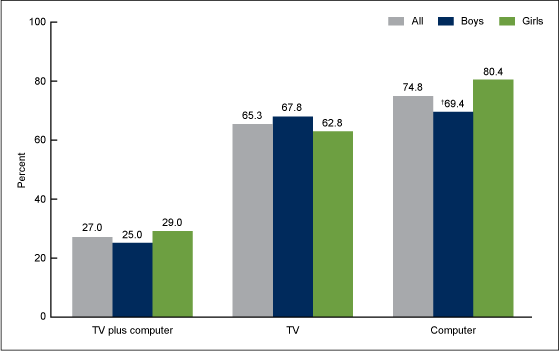About three of every four adolescents are in front of the TV and the computer beyond what is recommended, with youths who are overweight in front of screens more than their healthy weight peers, according to a new government report.
The National Center for Health Statistics report focused on how much screen time 12 to 15 year olds were getting outside of school, citing high screen times’ link with high blood pressure, cholesterol, and being overweight.
For cancer prevention, AICR recommends limiting sedentary activities. Long amounts of time sitting – such as watching TV – links to overweight and obesity, a cause of eight types of cancers. We wrote about the latest research linking inactivity and cancer risk last month.

The American Academy of Pediatrics (AAP) recommends that children limit entertainment screen time to two hours or less daily. (They recommend no screen time for children under age two.)
The findings of the National Center for Health Statistics report include:
- 27% of youths reported watching 2 hours or less of TV plus computer use daily.
- Girls (80%) were more likely to use the computer 2 hours or less daily when compared with boys (69%).
- More than 9 in 10 youth reported using the computer daily outside of school and watching some TV.
- Among underweight or normal-weight youth, 31% reported 2 hours or less of TV plus computer use daily compared with 23% and 20% for their overweight and obese peers, respectively.
- The percentage of youth watching TV for 5 hours or more a day was 6.9%, and 5.1% of youth used a computer for 5 hours or more a day
- Fewer non-Hispanic black youth aged 12–15 (53%) reported watching two hours or less of TV daily than non-Hispanic white (66%) and Hispanic (69%) youth.
The report used data from the 2012 National Health and Nutrition Examination Survey (NHANES) and the 2012 NHANES National Youth Fitness Survey.





